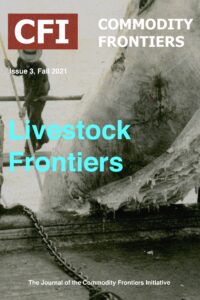The concept of commodity frontier has become an increasingly valued transdisciplinary device to explain the dynamic relationship between place-specific commodity production and global socio-spatial expansion. As Jason Moore, who coined the concept, has pointed out, capitalism developed as a new historical system to overcome ecological degradation by relocating entire production complexes. Illustrated by the examples of wheat, timber, and sugar production and trade, this chapter reviews how the concept of commodity frontiers has developed into a global historical-comparative framework that takes into account variations in time, space, and commodities. A focus on commodities and commodity frontiers is proving invaluable to understand the interaction between structural changes on a global scale and local processes of resilience, resistance, and accommodation. Indeed, the increasing popularity of the concept of commodity frontiers is driven by the widely felt need to confront the systemic causes of our current global ecological crisis from a bottom-up perspective


